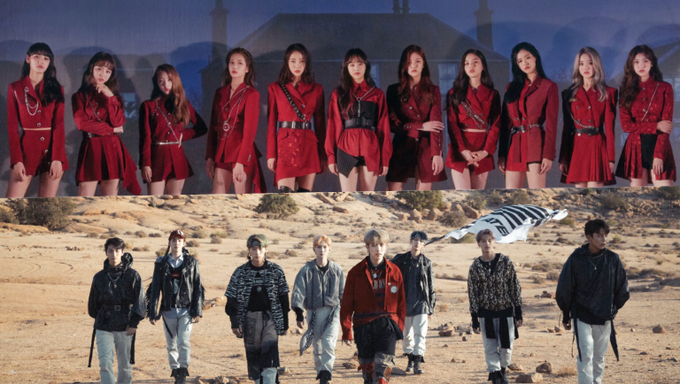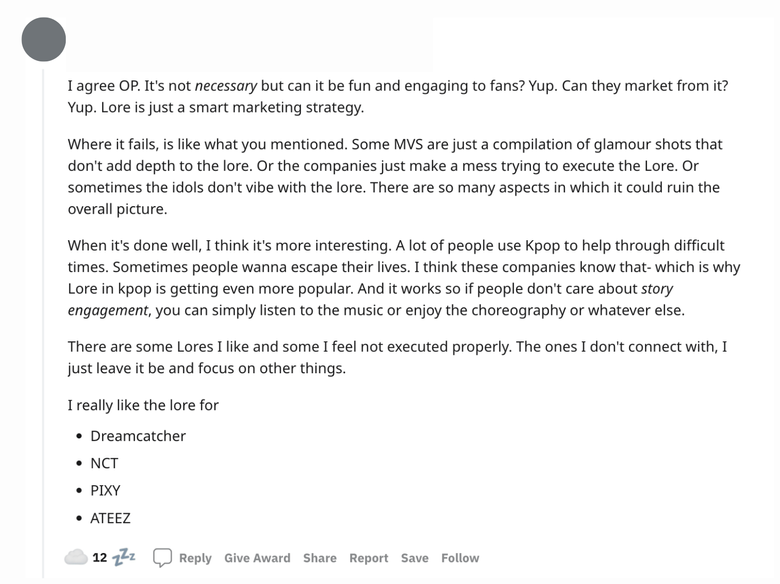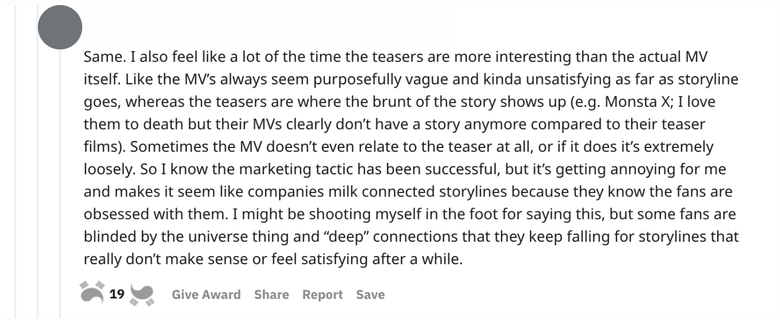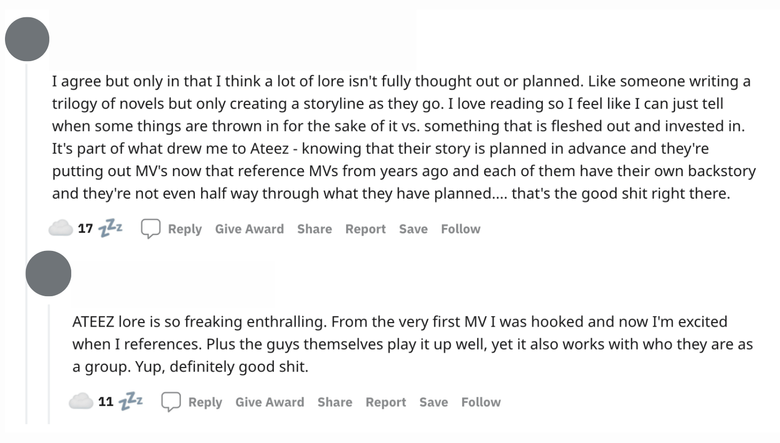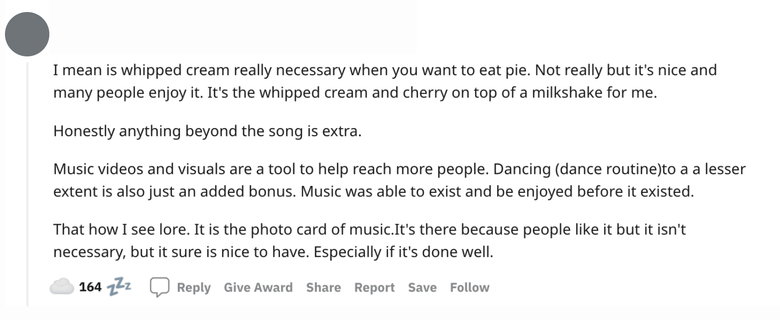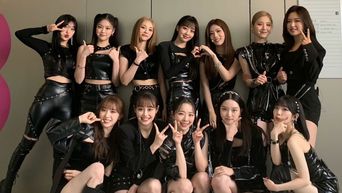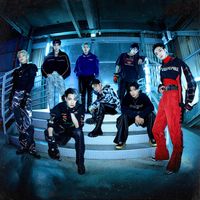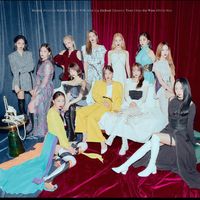Some companies have done this in the form of intriguing storylines, alternate universes, and/or lore. In K-Pop, alternate universes and lore create an alternate story (often with elements that are uncommon in reality) that links into a group’s concept. These narratives allow them to explore a world outside of the music that they create and involve fans in the conceptual aspect. These narratives often keep fans guessing about the next comeback and theorizing about the potential meaning of certain elements. Recently, there has been a debate among K-Pop fans about the value of groups having lore and/or alternate universes as part of their concept. Some are also debating whether it is necessary for groups to have these narratives. Note: This article will outline the lore/alternate universes/storylines of some groups. In some cases, companies do not confirm the meanings of their lore or storylines and leave them open to interpretation. Hence, the outlines in this article are based on general fan consensus.
How alternate universes/lore/storylines became popular
Alternate universes or lore often contain supernatural and fantasy elements embedded in the group’s identity. You can usually pick up a group’s universe or lore through their music videos or hints dropped in their content. Some groups carry this narrative through all of their comebacks and promotional activities. Whilst, some use these narratives for a short period, such as over a trilogy of album releases. Groups that have longstanding lore/storylines (from debut until the present) include groups such as LOONA, BTS, ATEEZ, and EXO, just to name a few. As an example, when EXO debuted in 2012 they introduced a storyline about being aliens from EXO Planet who lost their memories upon landing on Earth. Each member had a representative superpower such as telekinesis (the ability to move objects with your mind) or the ability to control time. In the story, the members were tasked with nurturing and protecting the tree of life. You can watch the introduction of their storyline here. “Korean entertainment companies have long understood that bestowing each member of their groups with distinct characteristics or personalities is a way of drawing interest and connecting with fans.” - Korea Joongang Daily, 2019 K-Pop idols have had representative personas since the first generation of K-Pop. They were usually linked to personality traits such as ‘moody’ or ‘witty’, etc. However, the advent of lore and alternate universes allowed companies to get creative with these personas. At first, when EXO debuted many fans couldn’t wrap their heads around the concept and the members’ personas, but this has become a standard throughout the years. You can especially see the rising trend in groups that debut these days. Other examples of groups with personas linked to storylines include when MONSTA X introduced their storyline and were characterized as the seven deadly sins. Additionally, WJSN are also associated with astrology as each member represents a zodiac sign regardless of whether it matches their actual star sign or not. Some groups also opt for short storylines giving fans the opportunity to immerse themselves deeper into their music, but without a connection between all of their comebacks. Companies are said to utilize these universes and characters for different reasons. One common reason that companies give for coming up with these worlds is to create a new plane of communication and content for fans to engage with, giving them an escape from reality. Some companies have even taken it as far as having all of their artists form part of one storyline/alternate universe. SM Entertainment created the SM Culture Universe (known as the SMCU) which they had been planning since 2011. Their goal is to realize a Virtual Nation through their universe featuring the various SM artists. SM tends not to specify whether each production (music video, content, etc.) they release falls into that universe or whether only some projects do. By not disclosing this fact, they have managed to create a buzz around each of their artist’s releases as fans theorize what they mean not only for that artist but also for the SMCU in general. One example of a fan theory is how BoA is speculated to be a villain in the SMCU or symbolize ‘Black Mamba’ from the song released by aespa because her name can be illustrative of a snake.
The implications of storylines: Are they necessary or not?
As you can see, there are varying degrees of the utilization of alternate universes and lore in K-Pop. Recently, compared to when only a few groups and companies used storylines, there has been an increase in groups utilizing them. Whether it is since their debut or years after the fact, it has become commonplace to develop storylines to keep fans’ interest. However, due to this saturation in the use of the conceptual tool/style many fans have grown frustrated and started to question the use of storylines in K-Pop. Some fans have started to feel that instead of deepening the connection between fans and their artists, the storylines are being used as surface-level marketing tools. Many feel that companies use the storyline hints and concept teasers to generate hype but do not follow through on the concept. This leaves fans with nothing but theories that are never answered. Fans are frustrated by the lack of follow-through by companies once they have created hype around their storyline. There have been groups where fans have invested time into understanding the lore across several comebacks or pieces of content, but it suddenly disappears or becomes convoluted.
— Ellee (@pluiedefeuilles) February 19, 2022 One fan explained how it feels like the teasers contain the brunt of the story then the music video is left vague to create room for the next round of teasers and storyline hints. It is essentially a tacit cycle with no closure. Meanwhile, other fans feel that it is difficult for new fans entering a fandom, of a group that has been continuing their storyline for years, to catch up and understand it. It might be intimidating and off-putting for those who want to newly enter a fandom. In the same breath, there have been times when even K-Pop idols were unable to explain their universe properly as there were a lot of elements to understand within a short explanation time.
— kinara👷🏽♀️ SVT DAY (@inseongbitch) June 2, 2021 Arguably, the issue for some fans may be that they don’t mind their group having lore or alternate universe, as long as it is relatively easy to understand and consistent throughout their promotional activities. There are several groups where their fans love and embrace lore and storylines. For example, ATEEZ’s storyline evolves from the concept of pirates going on a journey to seek treasure. In this case, a treasure can be anything that someone wants, but for ATEEZ it is success. The lore deals with dark and light but also focuses on identity and ambition. You can follow their growth as artists through their storyline and how it links to their music.
— 🎓MoonAtiny2407 turbulence is upon us (@goodatiny0707) October 18, 2021 Another group that gains praise for their lore is LOONA. The LOONAVERSE is the fictional world where the members live and exists on the Mobius strip. A Mobius strip is when a single plane is twisted and connected to itself. The three sub-units of LOONA exist within this world and represent different things. LOONA 1/3 represents realism found on Earth, ODD EYE CIRCLE represents changing characteristics and control of love over passiveness in middle Earth, and yyxy are beyond Earth but want to discover themselves. The tiny details and consistency in delivering their lore through their promotional activities have made their fans fond of the lore even when they don’t understand it fully.
— toji please choose me⁷ (@97kutty) March 3, 2020 Many fans have also argued that the debate about whether universes are essential or necessary in K-Pop groups is redundant. One fan, in particular, summarized it exceptionally well by emphasizing that just like a photo card that some fans would collect, a lore/storyline is not necessary but nice to have. Some fans will enjoy it and some won’t, but everyone should be allowed to feel how they want to about it. What do you think of lore, alternate universes, and storylines in K-Pop? Do you think they’re necessary? Let us know your thoughts in the comments.
3 Interesting Facts About The LOONAVERSE That All New ORBIT Should Know KPOP STORIES|Nov 12, 2021 These Are The Coolest Alternate Universes In K-Pop KPOP STORIES|Sep 23, 2021
